U bent hier
ICT
Elon Musk just gave another Mars speech—this time the vision seems tangible
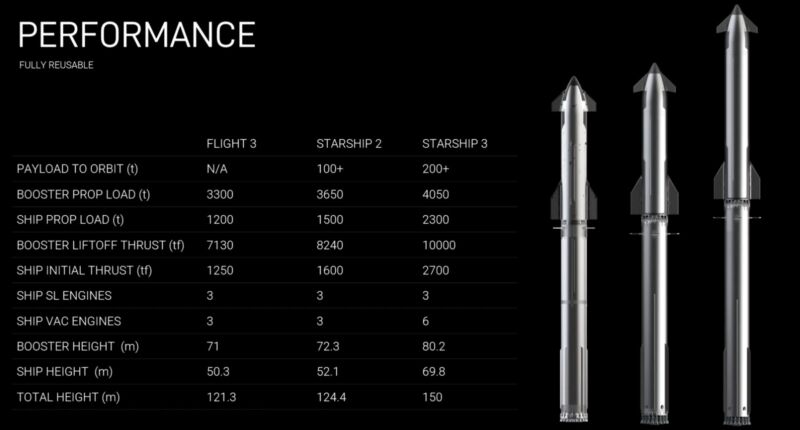
Enlarge / SpaceX will continue to iterate on Starship. (credit: SpaceX)
Elon Musk has been talking publicly about his sweeping vision for Mars settlement for nearly eight years now, dating to a speech in Guadalajara, Mexico, in September 2016.
This weekend, at SpaceX's Starbase facility in South Texas, Musk once again took up the mantle of his "making life multiplanetary" cause. Addressing employees at the location of the company's Starship factory, Musk spoke about the "high urgency" needed to extend the "light of consciousness" beyond Earth. That is not because humanity's home planet is a lost cause or should not be preserved. Rather, Musk said, he does not want humanity to remain a one-planet civilization that will, inevitably, face some calamity that will end the species.
All of this is fairly familiar territory for spaceflight enthusiasts—and observers of Musk. But during the last eight years he has become an increasingly controversial and polarizing figure. Based upon his behavior, many people will dismiss Musk's Mars comments as those of a megalomaniac. At least in regard to spaceflight, however, that would be wrong. Musk's multiplanetary ambitions today are more credible because SpaceX has taken steps toward doing what he said the company would do.
How insect blood stops bleeding fast

What if human blood turned into a sort of rubbery slime that can bounce back into a wound and stop it from bleeding in record time?
Until now, it was a mystery how hemolymph, or insect blood, was able to clot so quickly outside the body. Researchers from Clemson University have finally figured out how this works through observing caterpillars and cockroaches. By changing its physical properties, the blood of these animals can seal wounds in about a minute because the watery hemolymph that initially bleeds out turns into a viscoelastic substance outside of the body and retracts back to the wound.
“In insects vulnerable to dehydration, the mechanistic reaction of blood after wounding is rapid,” the research team said in a study recently published in Frontiers in Soft Matter. “It allows insects to minimize blood loss by sealing the wound and forming primary clots that provide scaffolding for the formation of new tissue.”
Elon Musk threatens to disobey court order over banned profiles
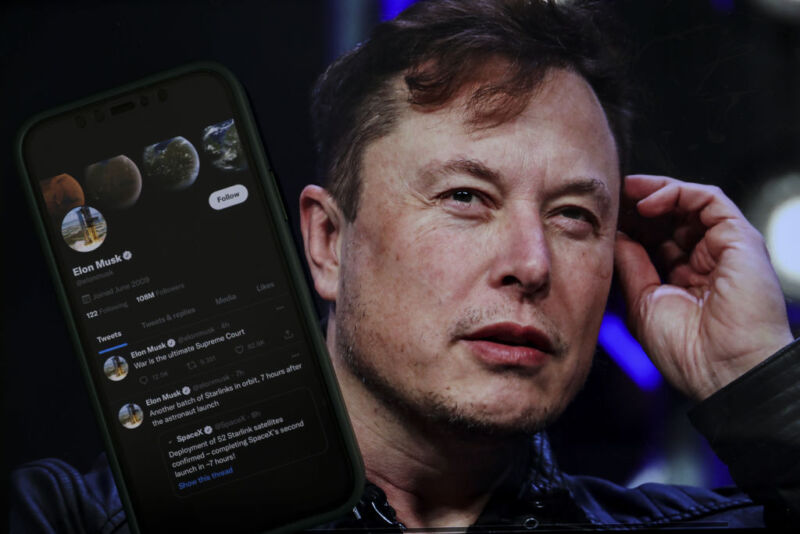
Enlarge (credit: Anadolu Agency / Contributor | Anadolu)
Brazil’s attorney general has demanded “urgent regulation” of social media sites after Elon Musk threatened to disobey a court order banning certain profiles on his X platform and after he called for a Supreme Court justice to “resign or be impeached.”
“It is urgent to regulate social networks,” said Jorge Messias.
“We cannot live in a society in which billionaires domiciled abroad have control of social networks and put themselves in a position to violate the rule of law, failing to comply with court orders and threatening our authorities.”
A frozen lake and several Lamborghinis provide lessons on traction control
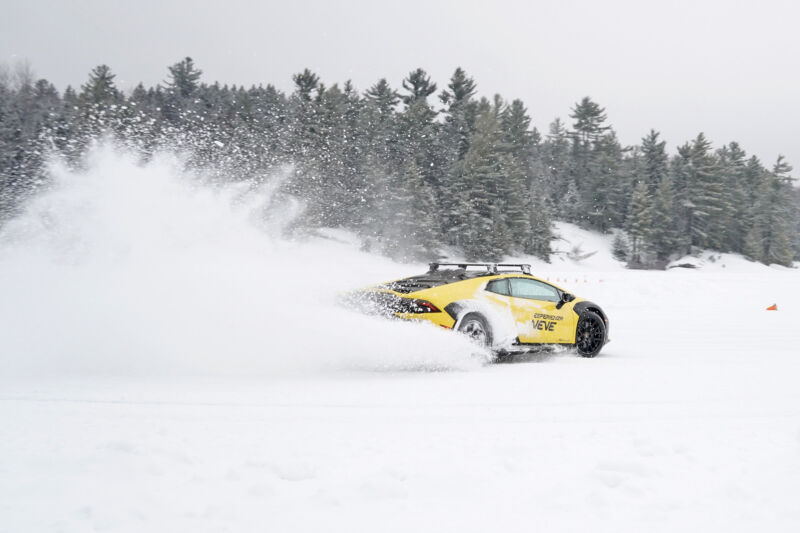
Enlarge / You can learn a lot about traction when there's very little of it around. (credit: Michael Teo Van Runkle)
Lamborghini provided flights from Las Vegas to Montreal and accommodation so Ars could attend the ice driving school. Ars does not accept paid editorial content.From the passenger seat of my Lamborghini Huracán Sterrato, 24 Hours of Daytona winner Corey Lewis gives me a "slow down" hand gesture, urging me to avoid an Urus high-centered on a snow bank. I resist the childish impulse to blast by at full throttle and spray the recovery crew with a fresh layer of snow because I don't want to be the next driver to cause a scene. Once we pass the group, I punch it again, countersteering into a wide drift as my studded Blizzak winter tires shred through snow and ice, exhaust wide open and barking at redline, cranking through a series of left-right-left transitions until we come back around to the stuck SUV.
Lewis and I both laugh—everybody spins at least once while ice-drifting Lamborghinis on Lake Catchima north of Montreal, which played host in February to North America's Esperienza Neve winter driving academy. This year, Lamborghini invited customers out to tear up the pristine Canadian winterscape in three Sterratos, four Uruses, and two rear-wheel-drive Huracán Tecnicas—all told, about $3 million worth of cars.
Drifting in six-figure Lambos might make anyone a little nervous. In the controlled environment of a 30-inch (762 mm)-thick ice sheet, though, the consequences are minimal (there are bruised egos whenever anybody loses control and needs a tow, of course). So much power on the slip-and-slide immediately exposes driver skill—or lack thereof—despite 400 studs per tire on the Huracáns and 300 per tire on the Uruses providing grip and confidence. Even for a driver as experienced as Lewis, ice-drifting still has its value. For the mere mortals among us, all the more so.
Why are there so many species of beetles?
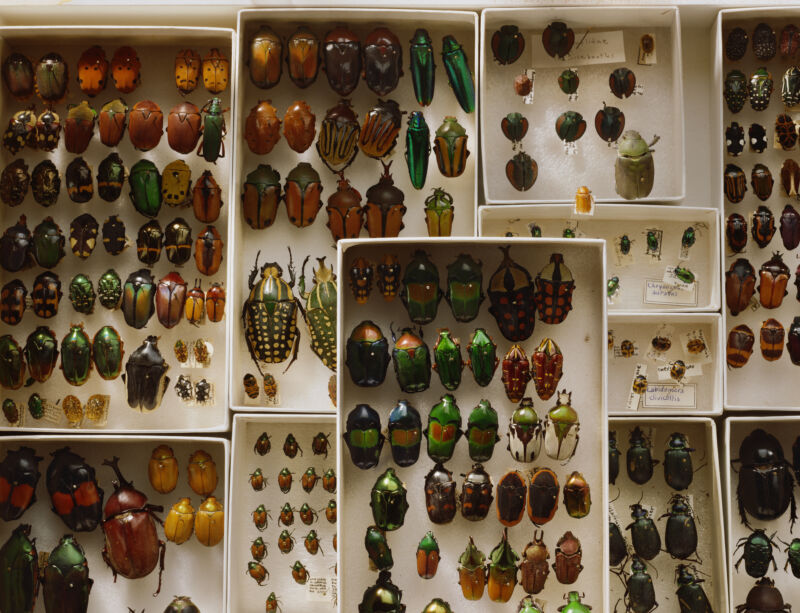
Enlarge (credit: Laurie Rubin via Getty)
Caroline Chaboo’s eyes light up when she talks about tortoise beetles. Like gems, they exist in myriad bright colors: shiny blue, red, orange, leaf green and transparent flecked with gold. They’re members of a group of 40,000 species of leaf beetles, the Chrysomelidae, one of the most species-rich branches of the vast beetle order, Coleoptera. “You have your weevils, longhorns, and leaf beetles,” she says. “That’s really the trio that dominates beetle diversity.”
An entomologist at the University of Nebraska, Lincoln, Chaboo has long wondered why the kingdom of life is so skewed toward beetles: The tough-bodied creatures make up about a quarter of all animal species. Many biologists have wondered the same thing, for a long time. “Darwin was a beetle collector,” Chaboo notes.
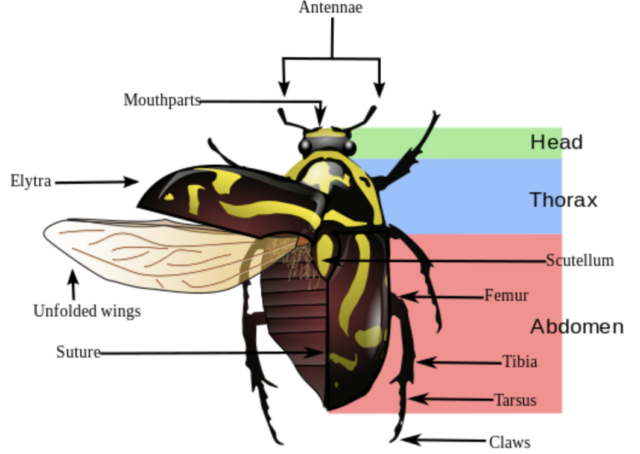
Despite their kaleidoscopic variety, most beetles share the same three-part body plan. The insects’ ability to fold their flight wings, origami-like, under protective forewings called elytra allows beetles to squeeze into rocky crevices and burrow inside trees. Beetles’ knack for thriving in a large range of microhabitats could also help explain their abundance of species, scientists say. (credit: Bugboy52.40 (CC BY-SA 3.0) via Wikimedia Commons)
Of the roughly 1 million named insect species on Earth, about 400,000 are beetles. And that’s just the beetles described so far. Scientists typically describe thousands of new species each year. So—why so many beetle species? “We don’t know the precise answer,” says Chaboo. But clues are emerging.
Claims of TikTok whistleblower may not add up

Enlarge (credit: SOPA Images | LightRocket | Getty Images)
The United States government is currently poised to outlaw TikTok. Little of the evidence that convinced Congress the app may be a national security threat has been shared publicly, in some cases because it remains classified. But one former TikTok employee turned whistleblower, who claims to have driven key news reporting and congressional concerns about the app, has now come forward.
Zen Goziker worked at TikTok as a risk manager, a role that involved protecting the company from external security and reputational threats. In a wrongful termination lawsuit filed against TikTok's parent company ByteDance in January, he alleges he was fired in February 2022 for refusing “to sign off” on Project Texas, a $1.5 billion program that TikTok designed to assuage US government security concerns by storing American data on servers managed by Oracle.
NASA knows what knocked Voyager 1 offline, but it will take a while to fix
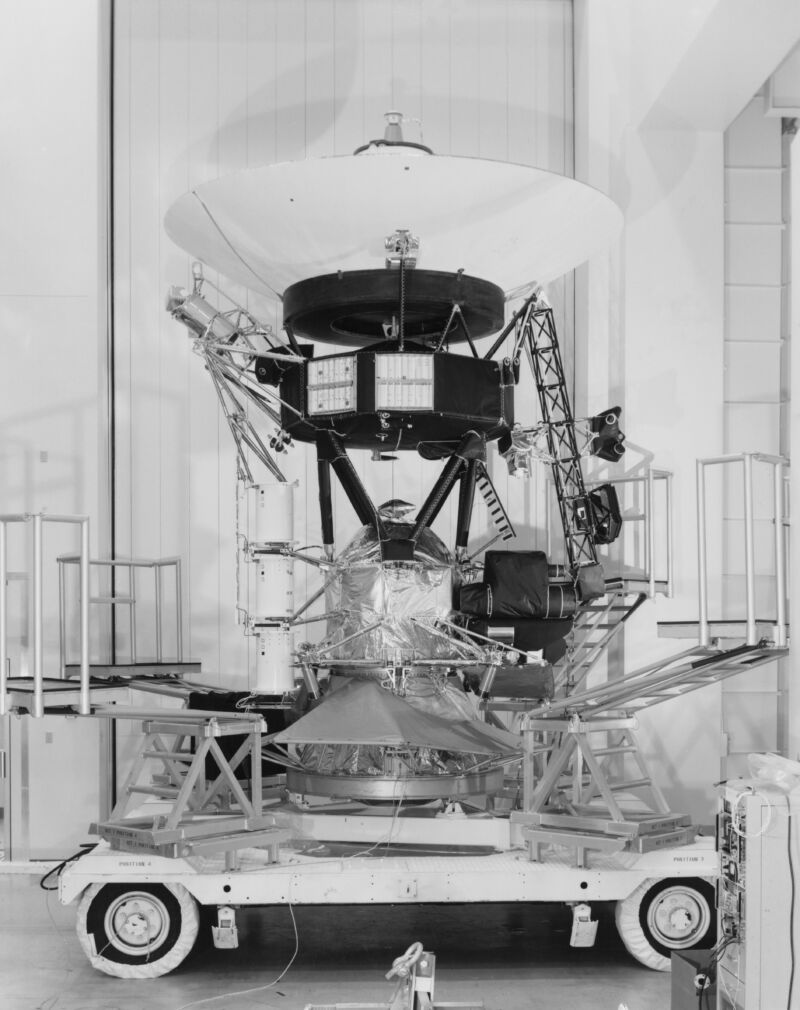
Enlarge / A Voyager space probe in a clean room at the Jet Propulsion Laboratory in 1977. (credit: Space Frontiers/Archive Photos/Getty Images)
Engineers have determined why NASA's Voyager 1 probe has been transmitting gibberish for nearly five months, raising hopes of recovering humanity's most distant spacecraft.
Voyager 1, traveling outbound some 15 billion miles (24 billion km) from Earth, started beaming unreadable data down to ground controllers on November 14. For nearly four months, NASA knew Voyager 1 was still alive—it continued to broadcast a steady signal—but could not decipher anything it was saying.
Confirming their hypothesis, engineers at NASA's Jet Propulsion Laboratory (JPL) in California confirmed a small portion of corrupted memory caused the problem. The faulty memory bank is located in Voyager 1's Flight Data System (FDS), one of three computers on the spacecraft. The FDS operates alongside a command-and-control central computer and another device overseeing attitude control and pointing.
$158,000 ALS drug pulled from market after failing in large clinical trial

Amylyx, the maker of a new drug to treat ALS, is pulling that drug from the market and laying off 70 percent of its workers after a large clinical trial found that the drug did not help patients, according to an announcement from the company Thursday.
The drug, Relyvrio, won approval from the Food and Drug Administration in September 2022 to slow the progression of ALS (amyotrophic lateral sclerosis, or Lou Gehrig's disease). However, the data behind the controversial decision was shaky at best; it was based on a study of just 137 patients that had several weaknesses and questionable statistical significance, and FDA advisors initially voted against approval. Still, given the severity of the neurogenerative disease and lack of effective treatments, the FDA ultimately granted approval under the condition that the company was working on a Phase III clinical trial to solidify its claimed benefits.
Relyvrio—a combination of two existing, generic drugs—went on the market with a list price of $158,000.
Apple now allows retro game emulators on its App Store—but with big caveats

Enlarge / The classic Sega Genesis game Sonic the Hedgehog running on an iPhone—in this case, as a standalone app. (credit: Samuel Axon)
When Apple posted its latest update to the App Store's app review and submission policies for developers, it included language that appears to explicitly allow a new kind of app for emulating retro console games.
Apple has long forbidden apps that run code from an external source, but today's announced changes now allow "software that is not embedded in the binary" in certain cases, with "retro game console emulator apps can offer to download games" specifically listed as one of those cases.
Here's the exact wording:
Roku has patented a way to show ads over anything you plug into your TV

Enlarge / A promotional image for a Roku TV. (credit: Roku)
Roku TV sets come with ads. Generally, these are restricted to Roku's home and menu screens, its screensavers, and its first-party video channels, and once you start playing video, the only ads you'll see are the ones from the service you're streaming from. That said, Roku TVs have shown ads atop live TV before.
Now, the company is apparently experimenting with ways to show ads over top of even more of the things you plug into your TV. A patent from spotted by Lowpass describes a system for displaying ads over any device connected over HDMI, a list that could include cable boxes, game consoles, DVD or Blu-ray players, PCs, or even other video streaming devices. Roku filed for the patent in August 2023 and it was published in November 2023, though it hasn't yet been granted.
The technology described would detect whether content was paused in multiple ways—if the video being displayed is static, if there's no audio being played, if a pause symbol is shown anywhere on screen, or if (on a TV with HDMI-CEC enabled) a pause signal has been received from some passthrough remote control. The system would analyze the paused image and use metadata "to identify one or more objects" in the video frame, transmit that identification information to a network, and receive and display a "relevant ad" over top of whatever the paused content is.
Will there be a Dune: Part Three? Yes… with caveats on timing

Enlarge / Legendary Pictures has confirmed that it plans to make Dune: Part Three with director Denis Villeneuve. (credit: YouTube/Warner Bros.)
Dune: Part Two is still raking in the moolah at the box office, and deservedly so. But judging by my various feeds, fans are already swooning over the prospect of director Denis Villeneuve extending his vision into a trilogy by adapting Frank Herbert's 1969 sequel, Dune Messiah, for the next installment. Will there be a Dune: Part Three? Most signs currently point to yes, with a couple of caveats. Exactly how soon we'll be seeing a return to Arrakis depends a lot on Villeneuve.
Variety confirmed that Legendary Pictures is working with the director on developing Dune: Part Three, although it remains unclear from the wording of the plethora of news items whether the project has officially been greenlit. ("Development" can mean a lot of things.) Naturally, the studio is eager, as are we: the film is the biggest hit of 2024 thus far, with global earnings of $630 million (although the hotly anticipated Deadpool and Wolverine this summer might give it a run for its money).
That confirmation sent fresh frissons of excitement across the Internet, although Villeneuve had been talking about the prospect as far back as September 2021. Those plans always depended on the success of Part Two, and that hurdle has obviously been cleared. By August 2023, the director was on record saying there were "words on paper" for a third film. And we learned just last month that composer Hans Zimmer was already working on the score for Dune: Part Three.
Tesla scraps its plan for a $25,000 Model 2 EV
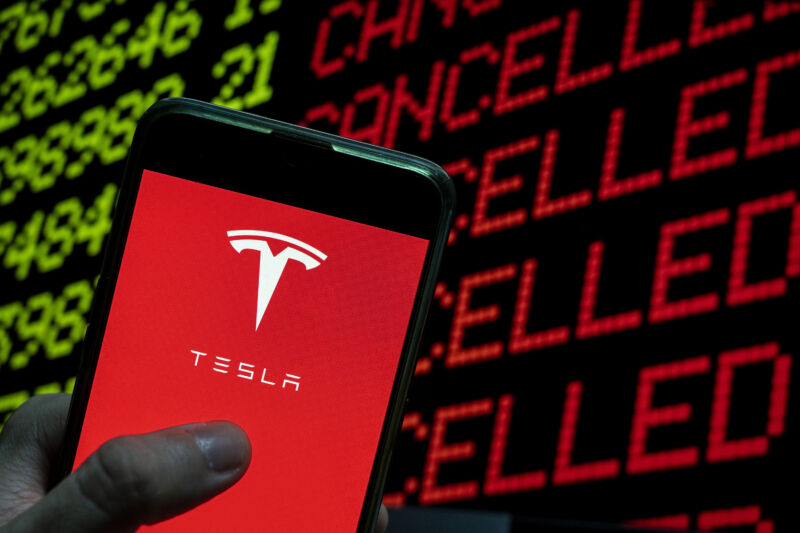
Enlarge (credit: Budrul Chukrut/SOPA Images/LightRocket via Getty Images)
Tesla has abandoned plans to develop an affordable electric Model 2, according to a report in Reuters. The news organization says it has reviewed company messages that say the affordable Model Y, which Tesla CEO Elon Musk claimed would sell for $25,000 or less, has been axed.
Musk has been talking about an affordable Tesla Model 2 for some time now. An affordable mass-market EV was supposedly always key to the company's long-range "master plans," and in December 2023 he said the company was working on a "low-cost electric vehicle that will be made at very high volume." Then, this March, Musk told Tesla workers that the Model 2 would go into production at the company's factory in Berlin, Germany.
In light of this news, that statement certainly raises eyebrows—Reuters reports that one of its three unnamed sources told it that the decision to scrap the Model 2 was made in late February. Instead, Musk is allegedly "all in on robotaxi," Tesla's plan to create an autonomous driving system that could allow its cars to compete with Uber or Lyft without a driver in the equation.
German state gov. ditching Windows for Linux, 30K workers migrating
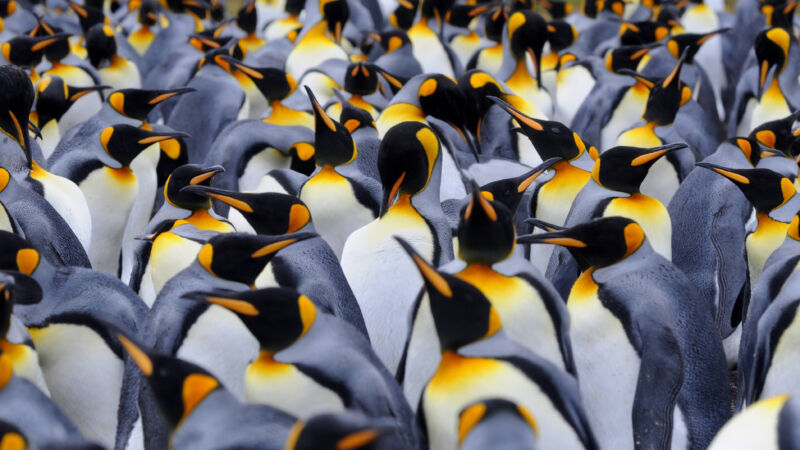
Schleswig-Holstein, one of Germany’s 16 states, on Wednesday confirmed plans to move tens of thousands of systems from Microsoft Windows to Linux. The announcement follows previously established plans to migrate the state government off Microsoft Office in favor of open source LibreOffice.
As spotted by The Document Foundation, the government has apparently finished its pilot run of LibreOffice and is now announcing plans to expand to more open source offerings.
In 2021, the state government announced plans to move 25,000 computers to LibreOffice by 2026. At the time, Schleswig-Holstein said it had already been testing LibreOffice for two years.
Android’s AirTag competitor gears up for launch, thanks to iOS release
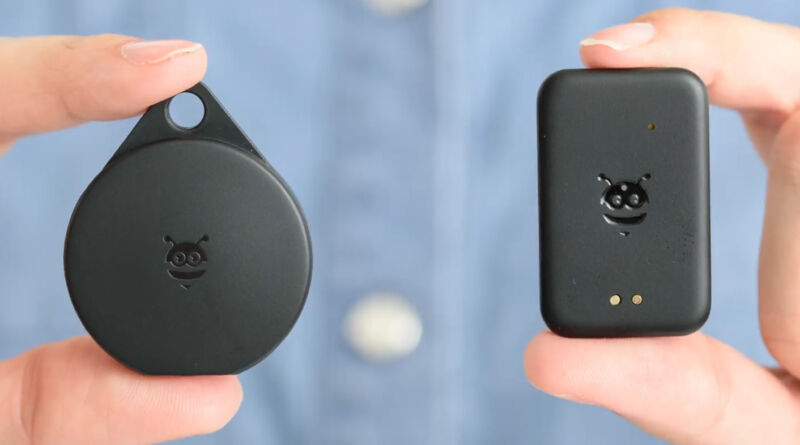
Enlarge / Pebblebee's Android trackers. (credit: Pebblebee)
Will Google ever launch its "Find My" network? The Android ecosystem was supposed to have its own version of Apple's AirTags by now. Google has had a crowd-sourced device-tracking network sitting dormant on 3 billion Android phones since December 2022. Partners have been ready to go with Bluetooth tag hardware since May 2023! This was all supposed to launch a year ago, but Google has been in a holding pattern. The good news is we're finally seeing some progress after a year of silence.
The reason for Google's lengthy delay is actually Apple. A week before Google's partners announced their Android network Bluetooth tags, Google and Apple jointly announced a standard to detect "unknown" Bluetooth trackers and show users alerts if their phone thinks they're being stalked. Since you can constantly see an AirTag's location, they can be used for stalking by just covertly slipping one into a bag or car; nobody wants that, so everyone's favorite mobile duopoly is teaming up.
Google did its half of this partnership and rolled out AirTag detection in July 2023. At the same time, Google also announced: "We’ve made the decision to hold the rollout of the Find My Device network until Apple has implemented protections for iOS." Surely Apple would be burning the midnight oil to launch iOS Android tag detection as soon as possible so that Google could start competing with AirTags.
Tiny cracks in rocks may have concentrated chemicals needed for life

Enlarge / Active geology could have helped purify key chemicals needed for life. (credit: Christof B. Mast)
In some ways, the origin of life is looking much less mystifying than it was a few decades ago. Researchers have figured out how some of the fundamental molecules needed for life can form via reactions that start with extremely simple chemicals that were likely to have been present on the early Earth. (We've covered at least one of many examples of this sort of work.)
But that research has led to somewhat subtler but no less challenging questions. While these reactions will form key components of DNA and protein, those are often just one part of a complicated mix of reaction products. And often, to get something truly biologically relevant, they'll have to react with some other molecules, each of which is part of its own complicated mix of reaction products. By the time these are all brought together, the key molecules may only represent a tiny fraction of the total list of chemicals present.
So, forming a more life-like chemistry still seems like a challenge. But a group of German chemists is now suggesting that the Earth itself provides a solution. Warm fluids moving through tiny fissures in rocks can potentially separate out mixes of chemicals, enriching some individual chemicals by three orders of magnitude.
FCC won’t block California net neutrality law, says states can “experiment”

Enlarge (credit: Getty Images | Matt Anderson Photography)
California can keep enforcing its state net neutrality law after the Federal Communications Commission implements its own rules. The FCC could preempt future state laws if they go far beyond the national standard but said that states can "experiment" with different regulations for interconnection payments and zero-rating.
The FCC scheduled an April 25 vote on Chairwoman Jessica Rosenworcel's proposal to restore net neutrality rules similar to the ones introduced during the Obama era and repealed under former President Trump. The FCC yesterday released the text of the pending order, which could still be changed but isn't likely to get any major overhaul.
State-level enforcement of net neutrality rules can benefit consumers, the FCC said. The order said that "state enforcement generally supports our regulatory efforts by dedicating additional resources to monitoring and enforcement, especially at the local level, and thereby ensuring greater compliance with our requirements."
Ivanti CEO pledges to “fundamentally transform” its hard-hit security model

Enlarge (credit: Getty Images)
Ivanti, the remote-access company whose remote-access products have been battered by severe exploits in recent months, has pledged a "new era," one that "fundamentally transforms the Ivanti security operating model" backed by "a significant investment" and full board support.
CEO Jeff Abbott's open letter promises to revamp "core engineering, security, and vulnerability management," make all products "secure by design," formalize cyber-defense agency partnerships, and "sharing information and learning with our customers." Among the details is the company's promise to improve search abilities in Ivanti's security resources and documentation portal, "powered by AI," and an "Interactive Voice Response system" for routing calls and alerting customers about security issues, also "AI-powered."
Ivanti CEO Jeff Abbott addresses the company's "broad shift" in its security model.
Ivanti and Abbott seem to have been working on this presentation for a while, so it's unlikely they could have known it would arrive just days after four new vulnerabilities were disclosed for its Connect Secure and Policy Secure gateway products, two of them rated for high severity. Those vulnerabilities came two weeks after two other vulnerabilities, rated critical, with remote code execution. And those followed "a three-week spree of non-stop exploitation" in early February, one that left security directors scrambling to patch and restore services or, as federal civilian agencies did, rebuild their servers from scratch.
Meta relaxes “incoherent” policy requiring removal of AI videos

Enlarge (credit: Francesco Carta fotografo | Moment)
On Friday, Meta announced policy updates to stop censoring harmless AI-generated content and instead begin "labeling a wider range of video, audio and image content as 'Made with AI.'"
Meta's policy updates came after deciding not to remove a controversial post edited to show President Joe Biden seemingly inappropriately touching his granddaughter's chest with a caption calling Biden a "pedophile." The Oversight Board had agreed with Meta's decision to leave the post online while noting that Meta's current manipulated media policy was too "narrow," "incoherent," and "confusing to users."
Previously, Meta would only remove "videos that are created or altered by AI to make a person appear to say something they didn’t say." The Oversight Board warned that this policy failed to address other manipulated media, including "cheap fakes," manipulated audio, or content showing people doing things they'd never done.
The science of smell is fragrant with submolecules
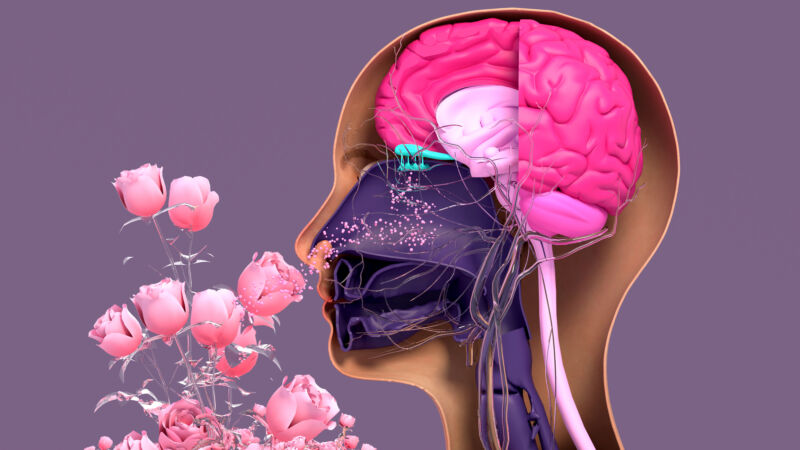
Enlarge (credit: Design Cells)
When we catch a whiff of perfume or indulge in a scented candle, we are smelling much more than Floral Fantasy or Lavender Vanilla. We are actually detecting odor molecules that enter our nose and interact with cells that send signals to be processed by our brain. While certain smells feel like they’re unchanging, the complexity of this system means that large odorant molecules are perceived as the sum of their parts—and we are capable of perceiving the exact same molecule as a different smell.
Smell is more complex than we might think. It doesn’t consist of simply detecting specific molecules. Researcher Wen Zhou and his team from the Institute of Psychology of the Chinese Academy of Sciences have now found that parts of our brains analyze smaller parts of the odor molecules that make things smell.
Smells like…So how do we smell? Odor molecules that enter our noses stimulate olfactory sensory neurons. They do this by binding to odorant receptors on these neurons (each of which makes only one of approximately 500 different odor receptors). Smelling something activates different neurons depending on what the molecules in that smell are and which receptors they interact with. The sensory neurons in the piriform cortex of the brain then use the information from the sensory neurons and interpret it as a message that makes us smell vanilla. Or a bouquet of flowers. Or whatever else.
Ford cuts EV plans even as it becomes nation’s second-largest EV brand

Enlarge / Electric F-150 sales are up 80 percent year over year. (credit: Ford)
Ford has caught a case of electric vehicle pessimism and is scaling back or delaying some of its plans for new EV models. A new electric pickup, scheduled to go into production next year, has been pushed back to 2026. And a three-row electric SUV has been given a two-year delay and will now not be available until 2027 at the earliest. The kicker? The automaker has published its sales for the first quarter of the year, and its EV sales are up a whopping 86 percent year over year.
Instead, the Blue Oval wants to focus on making more hybrids instead, and says it will have hybrid options for all its internal combustion engine-powered vehicles by 2030. Ford's current range of hybrids is not extensive, but it grew 42 percent in Q1 compared to the first three months of 2023.
Many of those—19,660 to be exact—were the Maverick Hybrid, despite the fact that for model year 2024, Ford removed the hybrid powertrain as the base model and effectively gave the electrified pickup a $1,500 price hike. In total, Ford sold 38,421 hybrids in Q1 2024, which it says makes this the best-ever quarter for hybrid sales. But they represent a rather small slice of its overall pie—just 7.6 percent of the 508,083 vehicles that Ford sold for the first three months of the year.







































































































![Reference manager - [Onderhoud aantekeningen]](http://labyrinth.rienkjonker.nl/sites/default/files/styles/medium/public/Reference%20manager%20v3%20-%20%5BOnderhoud%20aantekeningen%5D%2014-2-2010%20102617_0.jpg?itok=OJkkWhxY)
![Reference manager - [Onderhoud aantekeningen]](http://labyrinth.rienkjonker.nl/sites/default/files/styles/medium/public/Reference%20manager%20v3%20-%20%5BOnderhoud%20aantekeningen%5D%2014-2-2010%20102628.jpg?itok=CUvhRRr7)
![Reference manager - [Onderhoud bronnen] - Opnemen en onderhouden](http://labyrinth.rienkjonker.nl/sites/default/files/styles/medium/public/Reference%20manager%20v3%20-%20%5BOnderhoud%20bronnen%5D%2014-2-2010%20102418.jpg?itok=d7rnOhhK)
![Reference manager - [Onderhoud bronnen]](http://labyrinth.rienkjonker.nl/sites/default/files/styles/medium/public/Reference%20manager%20v3%20-%20%5BOnderhoud%20bronnen%5D%2014-2-2010%20102433.jpg?itok=CgS8R6cS)
![Reference manager - [Onderhoud bronnen]](http://labyrinth.rienkjonker.nl/sites/default/files/styles/medium/public/Reference%20manager%20v3%20-%20%5BOnderhoud%20bronnen%5D%2014-2-2010%20102445_0.jpg?itok=4oJ07yFZ)
![Reference manager - [Onderhoud bronnen]](http://labyrinth.rienkjonker.nl/sites/default/files/styles/medium/public/Reference%20manager%20v3%20-%20%5BOnderhoud%20bronnen%5D%2014-2-2010%20102500.jpg?itok=ExHJRjAO)
![Reference manager - [Onderhoud bronnen]](http://labyrinth.rienkjonker.nl/sites/default/files/styles/medium/public/Reference%20manager%20v3%20-%20%5BOnderhoud%20bronnen%5D%2014-2-2010%20102524.jpg?itok=IeHaYl_M)
![Reference manager - [Onderhoud bronnen]](http://labyrinth.rienkjonker.nl/sites/default/files/styles/medium/public/Reference%20manager%20v3%20-%20%5BOnderhoud%20bronnen%5D%2014-2-2010%20102534.jpg?itok=cdKP4u3I)
![Reference manager - [Onderhoud thema's en rubrieken]](http://labyrinth.rienkjonker.nl/sites/default/files/styles/medium/public/Reference%20manager%20v3%20-%20%5BOnderhoud%20themas%20en%20rubrieken%5D%2020-9-2009%20185626.jpg?itok=zM5uJ2Sf)













![Reference manager - [Raadplegen aantekeningen]](http://labyrinth.rienkjonker.nl/sites/default/files/styles/medium/public/Reference%20manager%20v3%20-%20%5BRaadplegen%20aantekeningen%5D%2020-9-2009%20185612.jpg?itok=RnX2qguF)
![Reference manager - [Relatie termen (thesaurus)]](http://labyrinth.rienkjonker.nl/sites/default/files/styles/medium/public/Reference%20manager%20v3%20-%20%5BRelatie%20termen%20%28thesaurus%29%5D%2014-2-2010%20102751.jpg?itok=SmxubGMD)
![Reference manager - [Thesaurus raadplegen]](http://labyrinth.rienkjonker.nl/sites/default/files/styles/medium/public/Reference%20manager%20v3%20-%20%5BThesaurus%20raadplegen%5D%2014-2-2010%20102732.jpg?itok=FWvNcckL)
![Reference manager - [Zoek thema en rubrieken]](http://labyrinth.rienkjonker.nl/sites/default/files/styles/medium/public/Reference%20manager%20v3%20-%20%5BZoek%20thema%20en%20rubrieken%5D%2020-9-2009%20185546.jpg?itok=6sUOZbvL)
![Reference manager - [Onderhoud rubrieken]](http://labyrinth.rienkjonker.nl/sites/default/files/styles/medium/public/Reference%20manager%20v3%2020-9-2009%20185634.jpg?itok=oZ8RFfVI)

![Reference manager - [Onderhoud aantekeningen]](http://labyrinth.rienkjonker.nl/sites/default/files/styles/medium/public/Reference%20manager%20v3%20-%20%5BOnderhoud%20aantekeningen%5D%2014-2-2010%20102603.jpg?itok=XMMJmuWz)


































































